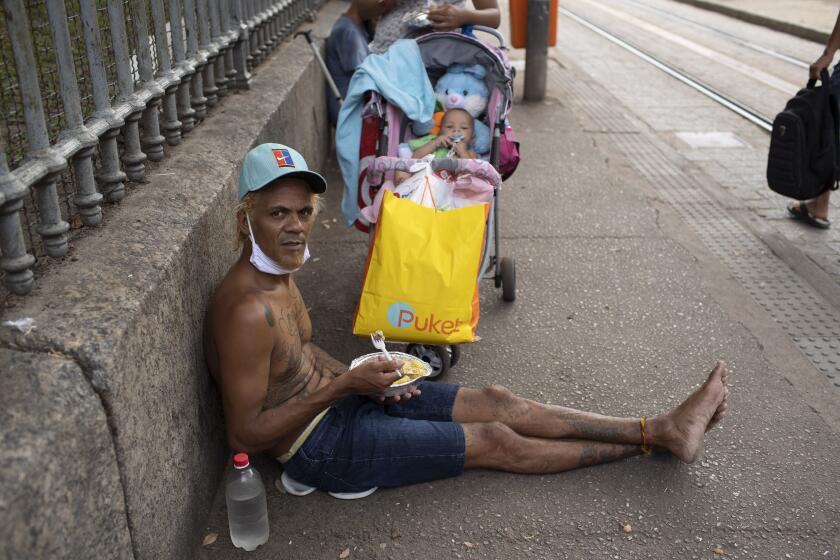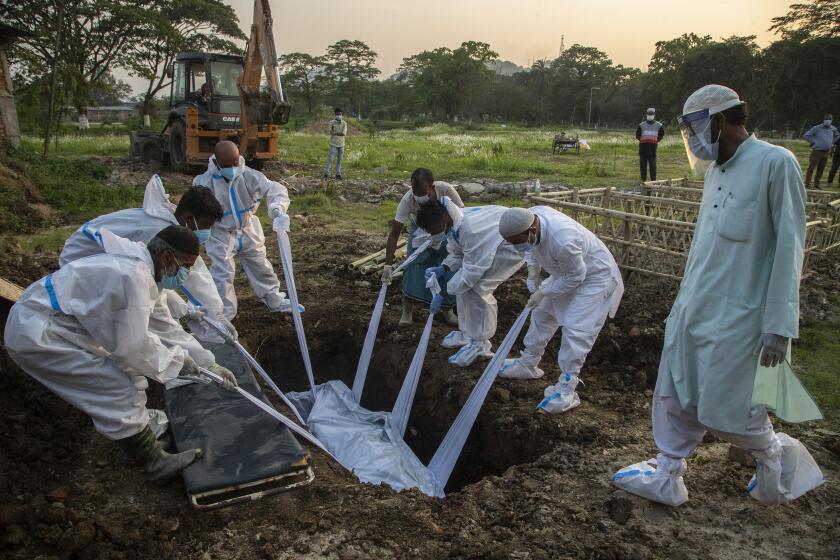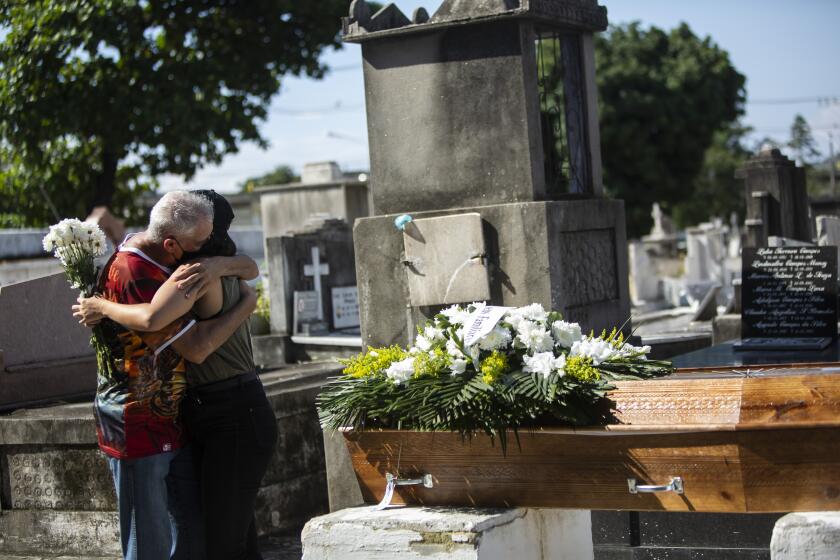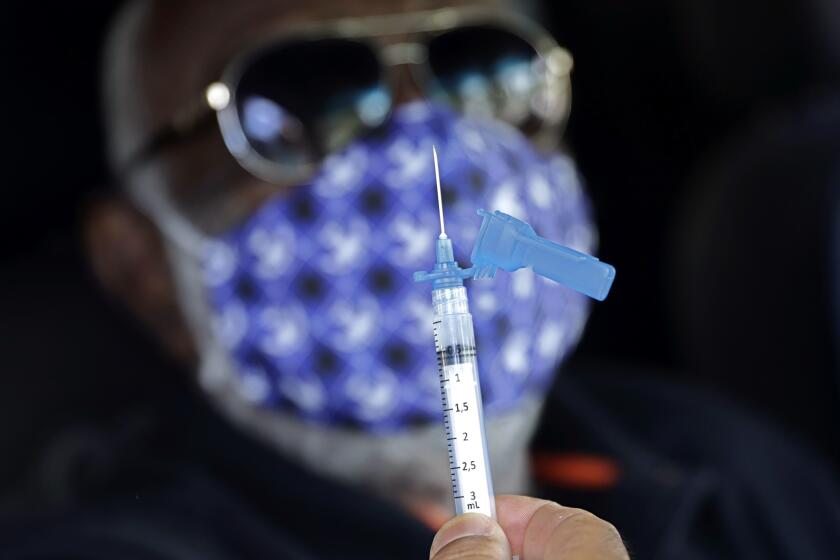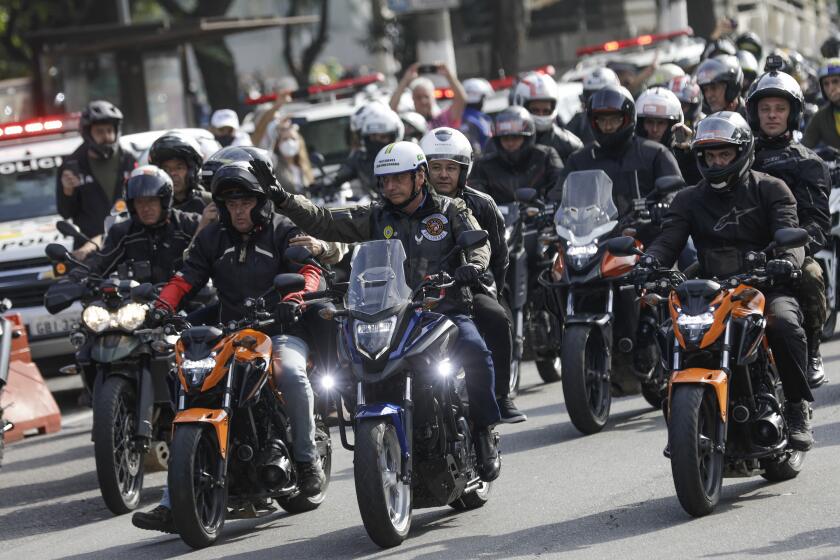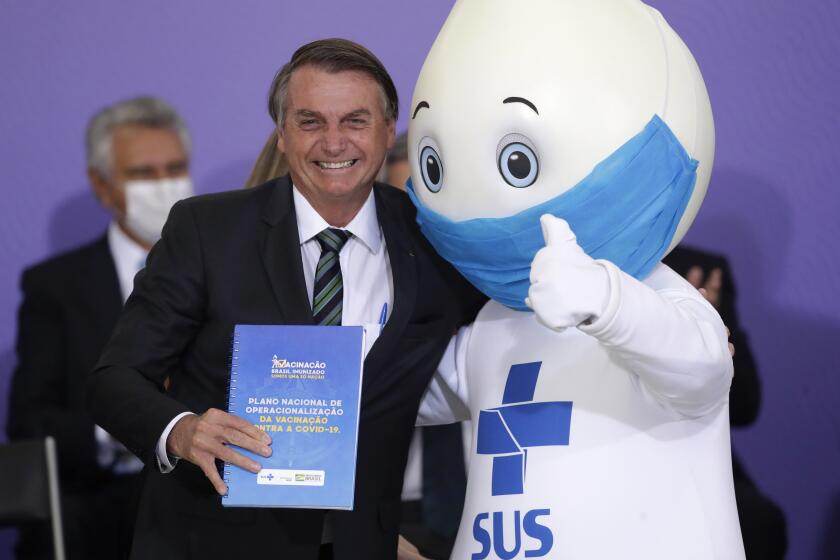Secret haircuts, an empty stadium, new COVID-19 cases and South Americaâs biggest soccer tournament
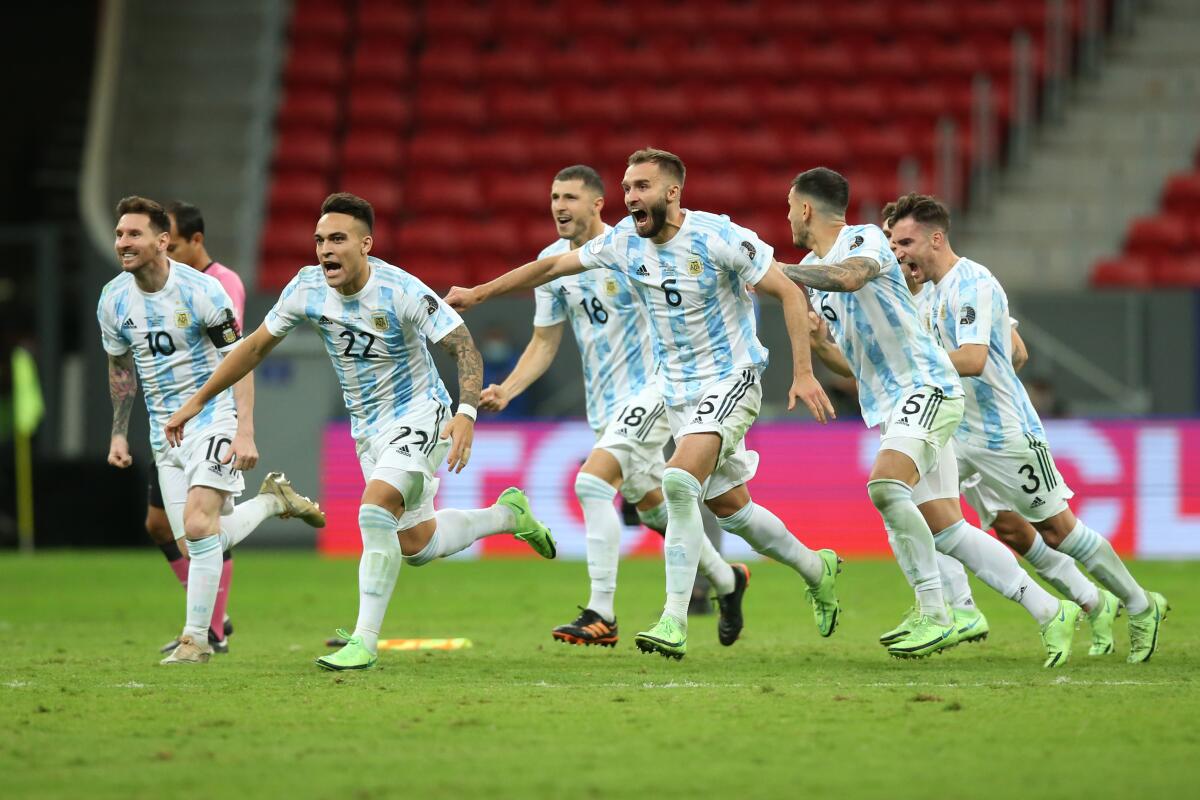
RIO DE JANEIRO â Just after nightfall about 60 miles north of here, Marlus Jesus was whisked into a hospital after hours to verify that he didnât have the coronavirus, then ushered into a hotel room.
His secret mission? The Brazilian soccer star Neymar da Silva Santos JĂșnior and several teammates wanted haircuts.
âI started cutting hair at about 8 p.m. and finished after midnight,â said the 32-year-old barber. âI cut the hair of seven or eight players.â
He couldnât resist posting a selfie with Neymar on Instagram.
The haircuts, which quickly became national news, burst a strict âsanitary bubbleâ meant to keep the coronavirus out of the Copa America, the premier soccer tournament on the continent.
The event has been shrouded in controversy since organizers hurriedly moved it to virus-stricken Brazil in early June, less than two weeks before kickoff. The original co-hosts, Argentina and Colombia, had suddenly bowed out, citing an alarming rise in coronavirus cases.
Brazilian President Jair Bolsonaro insists there will be no national lockdown even as the country faces a surging COVID-19 caseload and death toll.
Brazil, where COVID-19 has claimed at least 530,179 lives, a toll second only to the United States, was a curious second choice. Infections were surging to unprecedented levels as the country entered a devastating third wave. But, to the shock of many, President Jair Bolsonaro enthusiastically agreed that Brazil be the host.
âFrom the beginning I have been saying, when it comes to the pandemic: I am sorry for the deaths, but we have to live,â said the far-right populist, who is being investigated by a congressional committee for his handling of the pandemic, including possible corruption related to the purchase of vaccines.
Government health authorities and Copa Americaâs organizers say those taking part in the tournament are following strict protocols to avoid infections, as 10 teams compete in four Brazilian cities. Crowds are barred from stadiums and players must stay in their rooms when not training or playing matches. Nearly 26,000 coronavirus tests had been administered as of this week.
But outside health experts say the event is complicating Brazilâs fight against the virus.
In the United States, normality is an illusion if we canât contain this global pandemic.
At least 165 new cases have been linked directly to the tournament. A total of 37 were players, coaches, trainers and other team personnel, while 125 were drivers, caterers, cleaners and others providing services for the tournament. Three work for Conmebol, the South American soccer federation, which provides medics and referees to the tournament.
âWeâve seen that the majority of cases were not among players â they were the people providing them with services,â said Dr. Lucia Campos Pellanda, an epidemiologist and dean of Porto Alegreâs Federal University of Health Sciences. âItâs really cruel â to expose people who are already vulnerable.â
Without systematic contact tracing, authorities are unable to determine how those infections may have spread the coronavirus into the wider population.
Enforcing protocols â and controlling the players off the field â has proved challenging. Members of Chileâs team were accused of partying and inviting prostitutes to their hotel. Venezuelan team members infected with the coronavirus allegedly broke quarantine, sneaking out of their rooms. Hotel workers who came in contact with the rogue players complained that their pleas for testing were ignored for days.
Brazil has become the second country in the world to top 400,000 COVID-19 deaths despite some recent signs of containment of the coronavirus.
With the Tokyo Olympics just over two weeks away, Brazil may serve as a grim bellwether on whether behemoth multinational sporting events can be held safely as the pandemic still rages on. The Summer Games have sparked protests as coronavirus cases surge across Asia, and authorities announced Thursday that fans would be barred from Olympics venues.
âEven if the risk is minimal, even if an event like this results in a single death â is it worth it?â Pellanda asked.
Outraged Brazilians have dubbed the tournament âCova America,â rebranding it using the Portuguese word for âgrave.â Memes of a coffin kicking a coronavirus have swept through social media.
Brazil has advanced to the final, scheduled for Saturday. But many fans say that even if it wins and retains the title it captured in 2019, there will be little to celebrate.
âThere just isnât that same joy that the game usually brings,â said JĂșlia Passos, a 21-year-old food service worker. âThis time, it brings a lot of sadness. Because it canât erase what happened, how many people have died.â
Her family, like so many others, saw the devastation of COVID-19 up close. Her stepfather spent a week in hospital, struggling to breathe.
Start your day right
Sign up for Essential California for the L.A. Times biggest news, features and recommendations in your inbox six days a week.
You may occasionally receive promotional content from the Los Angeles Times.
âWith all the pain Brazil is going through, that weâre going through,â Passos said, âit is not the time to host a huge sporting event like this.â
Still, she couldnât turn down a gig in one Rio stadium hosting some of the matches. Out of work since March, the young mother needed the income. On game days, she earns $20 serving food and drinks to the coaches, organizers and security staff.
Passos managed to get one dose of COVID-19 vaccine, and she and her colleagues are tested for coronavirus every other day. Nonetheless, she said, the job feels risky, starting with her 25-mile commute from the outskirts of the city.
âWe end up so exposed. We take trains packed full of people to get to work,â she said. âBut I really needed the work.â
Brazilâs federal government says it has reached a deal to purchase 10 million doses of the Russian-made Sputnik V vaccine against COVID-19, though the shot is yet to be approved by the South American nationâs health agency.
Her stepbrother, JĂșnior Campos, needed money too and also jumped at the chance to nab a job at the stadium. Yet, even as a soccer fan, the tournament left a bitter taste.
âI lost my uncle and, just last week, I lost my best friend too,â said Campos, 21, who was applying to colleges when the pandemic struck. âWeâve lost so many people to the virus. And so many are still dying. Itâs absurd to have this event, to pretend like life is back to normal here, like in Europe.â
The Euro Cup, which is being held in 11 countries across the continent, kicked off in June amid easing lockdowns and ramped-up vaccination campaigns in many of the host nations. But even with reduced stadium capacity and rigid travel restrictions, the tournament has failed to fully avoid infection. The World Health Organization sounded an alarm recently, pointing to overcrowding and clusters of cases.
Health experts warn the risks are even greater in Brazil, where just over 13% of the population is fully vaccinated. One particular worry is that highly contagious new variants could gain traction. The Delta strain â first discovered in India â was spotted in one city hosting Copa America matches, though authorities are still unsure if it infected tournament participants.
In the last two weeks, daily coronavirus cases have eased from Juneâs record peaks. But health experts still fear spikes. And with the lag between infections and illness and hospitalization, they warn that the tournamentâs full effects may not become clear for weeks.
Brazilâs President Jair Bolsonaro led motorcyclist supporters through the streets of Sao Paulo â and got hit with a fine for failure to wear a mask.
Unlike much of the world, Brazil never closed down to contain the virus. All along, Bolsonaro downplayed COVID-19 and urged Brazilians to keep working. Despite the countryâs staggering death toll, he insisted that lockdowns kill more people than the virus by hurting the economy.
Brazil ultimately lost out on both fronts. As the virus ripped through the country undeterred, the pandemic decimated the economy. A welfare scheme helped keep informal workers afloat last year, but the aid was slashed significantly as public spending ballooned.
Angry Brazilians have taken to the streets, calling for vaccines, economic aid and impeachment of the president. Nearly 15 million are out of jobs and hunger has almost doubled, with 19 million routinely going without food during the pandemic.
Faced with economic need, millions risk their health in search of work, including in the Copa America.
Leaders of all three branches of Brazilâs armed forces have jointly resigned following President Jair Bolsonaroâs replacement of the defense minister.
On a recent morning, Viviane Azevedo served breakfast to the Copa America delegations at a ritzy hotel in Rioâs wealthy south zone. Still waiting for her second dose of vaccine, she was happy for extra shifts at the hotel that came with the influx of guests.
âItâs a disgrace really, hosting this tournament now,â said Azevedo, 43, who went back to waitressing after being laid off from a piercing studio early in the pandemic. âBut for us, thereâs no other way. In todayâs Brazil, if you donât take the risk, youâll go hungry.â
Murilo Castro Vianna, 61, waited outside the same hotel in a white shuttle bus, ready to drive Uruguayâs team to training. Earlier in his 12-hour shift, he had dropped off an injured player at the airport. A few days earlier, a fellow driver had been sickened by COVID-19.
âIâve spent every day of this pandemic on the street, working,â he said. Before this, he had driven around linesmen working for an electricity company. âHere, Iâm being tested. I wear my mask, I try to be careful. Thatâs all you can do.â
Rumors and conspiracy theories swirled this week regarding the whereabouts of ZĂ© Gotinha, the mascot for Brazilâs national vaccination program
Back at the barbershop he owns in Belford Roxo, a working-class neighborhood on the northern fringe of Rio, Jesus was clad in a face mask as he swiftly razed a little boyâs hair into a mullet, like the ones worn by soccer stars.
One chair over, an unmasked employee trimmed a clientâs beard, then doused it in a fragrant spray. Stand-up comedy blared from the television.
Jesusâ secret mission last month wasnât the first time he cut the hair of Brazilâs soccer elite. But the Copa America job was a chance he couldnât pass up.
The tiny, bright shop had remained shut for much of the pandemic. Jesus kept cutting hair in the homes of clients, to stay afloat.
âAre we afraid of the virus?â Jesus said. âOf course weâre afraid. But we have to work.â
Ionova is a special correspondent.
More to Read
Sign up for Essential California
The most important California stories and recommendations in your inbox every morning.
You may occasionally receive promotional content from the Los Angeles Times.
